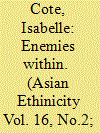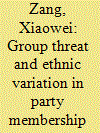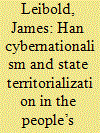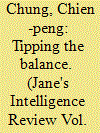| Srl | Item |
| 1 |
ID:
137218


|
|
|
|
|
| Summary/Abstract |
How can we account for the targeted pattern of violence in Xinjiang, in which Uyghur secessionist groups attack some second-order minorities such as the Han Chinese and the Hui, but not the sizeable populations of Kazak, Kyrgyz, and Mongol minorities? Based on a variety of primary and secondary sources, I argue that members of the Han minority, being the national majority in China but a ‘nested minority’ in Xinjiang, are doomed to become a primary target of secessionist attacks as they represent, in and of themselves, the state from which Uyghur nationalists are trying to secede. Han Chinese’s – and to a lesser extent the Hui’s – economic and political dominance over the Uyghurs, along with their lack of historical ties to Xinjiang, also motivates their targeting while reinforcing the bond between other indigenous and comparatively disadvantaged minorities.
|
|
|
|
|
|
|
|
|
|
|
|
|
|
|
|
| 2 |
ID:
112440


|
|
|
|
|
| Publication |
2012.
|
| Summary/Abstract |
Many scholars have examined how human capital, geography, etc. have shaped patterns of ethnic inequality in China. This paper studies the role the state plays in producing inter-group disparities in China. It discusses the link between the state and minority threat and explains how the linkage produces ethnic variation in entry into the Chinese Communist Party. Data are drawn from two surveys (N = 3,619) on Han Chinese, Hui, and Uyghurs conducted in two Chinese cities in 2001. Controlling for background characteristics removes the Han-Uyghur difference in CCP membership attainment. In contrast, no similar patterns are found when Han Chinese are compared with Hui. This contrast is explained with reference to state reaction to ethnic variation in perceived group threat.
|
|
|
|
|
|
|
|
|
|
|
|
|
|
|
|
| 3 |
ID:
144072


|
|
|
|
|
| Summary/Abstract |
Han majority nationalism poses a significant yet under-theorized challenge to state sovereignty and territorial integrity in China, especially in the era of the Internet. By shifting our focus from minority secessionist movements on the ground in Xinjiang and Tibet to a group of Han nationalists active in cyberspace, this article probes the friction between three distinct yet interrelated ideologies of spatiality in contemporary China: the processes and practices of state territorialization; counter-narratives and geographies of Han cybernationalism; and the transnational flows of the Sinophone Internet. It argues that the Internet empowers yet ultimately blunts the threat of Han nationalism, rendering it largely impotent when faced with the hegemony of state territorialization.
|
|
|
|
|
|
|
|
|
|
|
|
|
|
|
|
| 4 |
ID:
090169


|
|
|
|
|
| Publication |
2009.
|
| Summary/Abstract |
The ethnic violence that killed at least 197 people in Urumqi, capital of China's Xinjiang Uighur Autonomous Region (XUAR),
in early July is a stark reminder of the centrifugal forces pulling at China's centre.While China's overwhelming security forces were able to end the violence, the unrest highlighted the widespread discontent among the Uighur population in the XUAR, The once-majority Uighurs remain disconcerted by the migration of Han Chinese to the western region, which threatens to overwhelm them demographically and culturally.
|
|
|
|
|
|
|
|
|
|
|
|
|
|
|
|